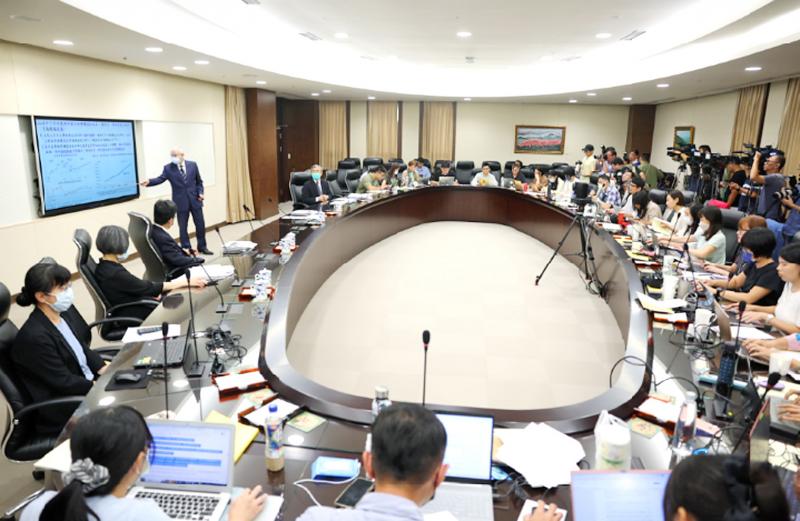The central bank said yesterday that it has upgraded its forecast of Taiwan’s GDP growth for this year to 3.82 percent, with the export-oriented economy expected to benefit from robust global demand for emerging technologies.
The upgrade was announced after the central bank wrapped up its quarterly policymaking meeting, raising this year's GDP growth from the previous estimate of 3.77 percent made in June.
The revised forecast came closer to an estimate by the Directorate-General of Budget, Accounting and Statistics (DGBAS) last month, which forecast GDP would grow 3.9 percent this year.

Photo: CNA
In addition to a strong export performance, the local economy is also boosted by an increase in private investment and private consumption, the central bank said.
However, due to a relatively high comparison base last year, the economy would grow 1.99 percent in the second half of this year after a 5.83 percent increase in the first half, it said.
The central bank also raised its forecast for consumer price index (CPI) growth from 2.12 percent in June to 2.16 percent, while it lowered its forecast for growth in core CPI, which excludes fruit, vegetables and energy to 1.94 percent, below the 2 percent alert set by the bank.
Since June, bad weather has adversely impacted agricultural supplies and pushed up the price of fruit and vegetables so the central bank raised its CPI growth forecast, but core CPI growth will continue its downtrend, with fruit and vegetables excluded, it said.
For next year, the central bank said exports and private investment are expected to continue to grow and with momentum in private consumption on the rise, the economy is expected to grow steadily at 3.08 percent.
In the policymaking meeting, the central bank also decided to leave its key interest rates unchanged for the second consecutive quarter despite a 50 basis point cut by the US Federal Reserve overnight.
After the decision, the discount rate remains at 2 percent which is still the highest in 15 years, with the rate on accommodation with collateral at 2.375 percent, and the rate on accommodations without collateral at 4.250 percent.

Micron Memory Taiwan Co (台灣美光), a subsidiary of US memorychip maker Micron Technology Inc, has been granted a NT$4.7 billion (US$149.5 million) subsidy under the Ministry of Economic Affairs A+ Corporate Innovation and R&D Enhancement program, the ministry said yesterday. The US memorychip maker’s program aims to back the development of high-performance and high-bandwidth memory chips with a total budget of NT$11.75 billion, the ministry said. Aside from the government funding, Micron is to inject the remaining investment of NT$7.06 billion as the company applied to participate the government’s Global Innovation Partnership Program to deepen technology cooperation, a ministry official told the

Taiwan Semiconductor Manufacturing Co (TSMC, 台積電), the world’s leading advanced chipmaker, officially began volume production of its 2-nanometer chips in the fourth quarter of this year, according to a recent update on the company’s Web site. The low-key announcement confirms that TSMC, the go-to chipmaker for artificial intelligence (AI) hardware providers Nvidia Corp and iPhone maker Apple Inc, met its original roadmap for the next-generation technology. Production is currently centered at Fab 22 in Kaohsiung, utilizing the company’s first-generation nanosheet transistor technology. The new architecture achieves “full-node strides in performance and power consumption,” TSMC said. The company described the 2nm process as

Shares in Taiwan closed at a new high yesterday, the first trading day of the new year, as contract chipmaker Taiwan Semiconductor Manufacturing Co (TSMC, 台積電) continued to break records amid an artificial intelligence (AI) boom, dealers said. The TAIEX closed up 386.21 points, or 1.33 percent, at 29,349.81, with turnover totaling NT$648.844 billion (US$20.65 billion). “Judging from a stronger Taiwan dollar against the US dollar, I think foreign institutional investors returned from the holidays and brought funds into the local market,” Concord Securities Co (康和證券) analyst Kerry Huang (黃志祺) said. “Foreign investors just rebuilt their positions with TSMC as their top target,

POTENTIAL demand: Tesla’s chance of reclaiming its leadership in EVs seems uncertain, but breakthrough in full self-driving could help boost sales, an analyst said Chinese auto giant BYD Co (比亞迪) is poised to surpass Tesla Inc as the world’s biggest electric vehicle (EV) company in annual sales. The two groups are expected to soon publish their final figures for this year, and based on sales data so far this year, there is almost no chance the US company led by CEO Elon Musk would retain its leadership position. As of the end of last month, BYD, which also produces hybrid vehicles, had sold 2.07 million EVs. Tesla, for its part, had sold 1.22 million by the end of September. Tesla’s September figures included a one-time boost in